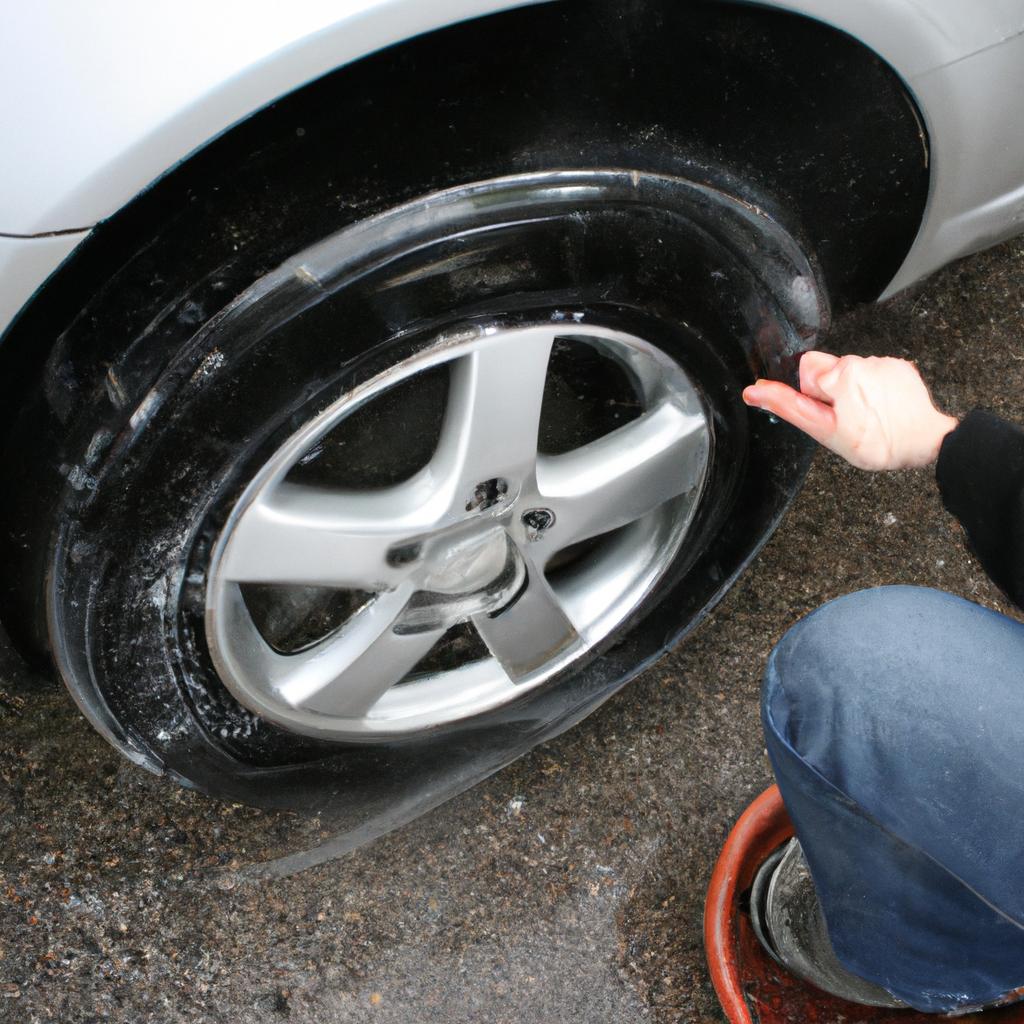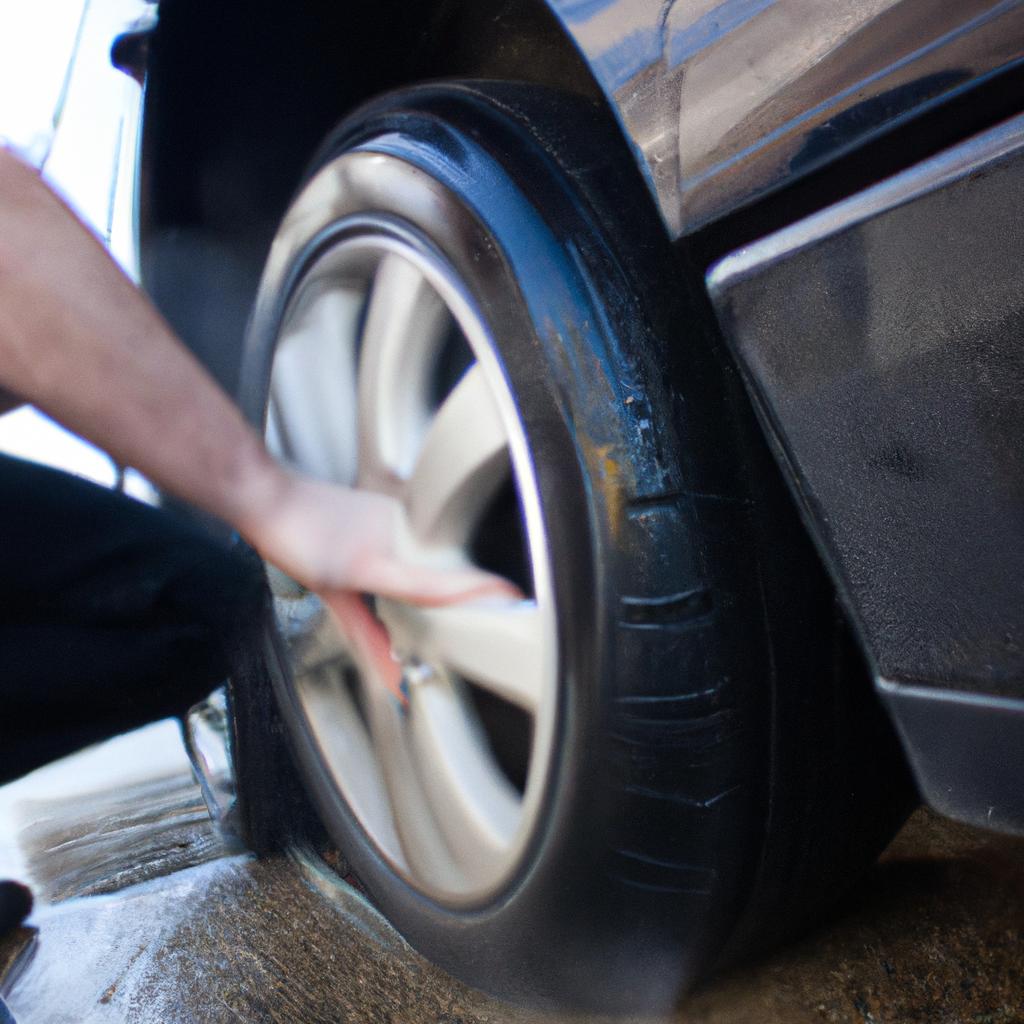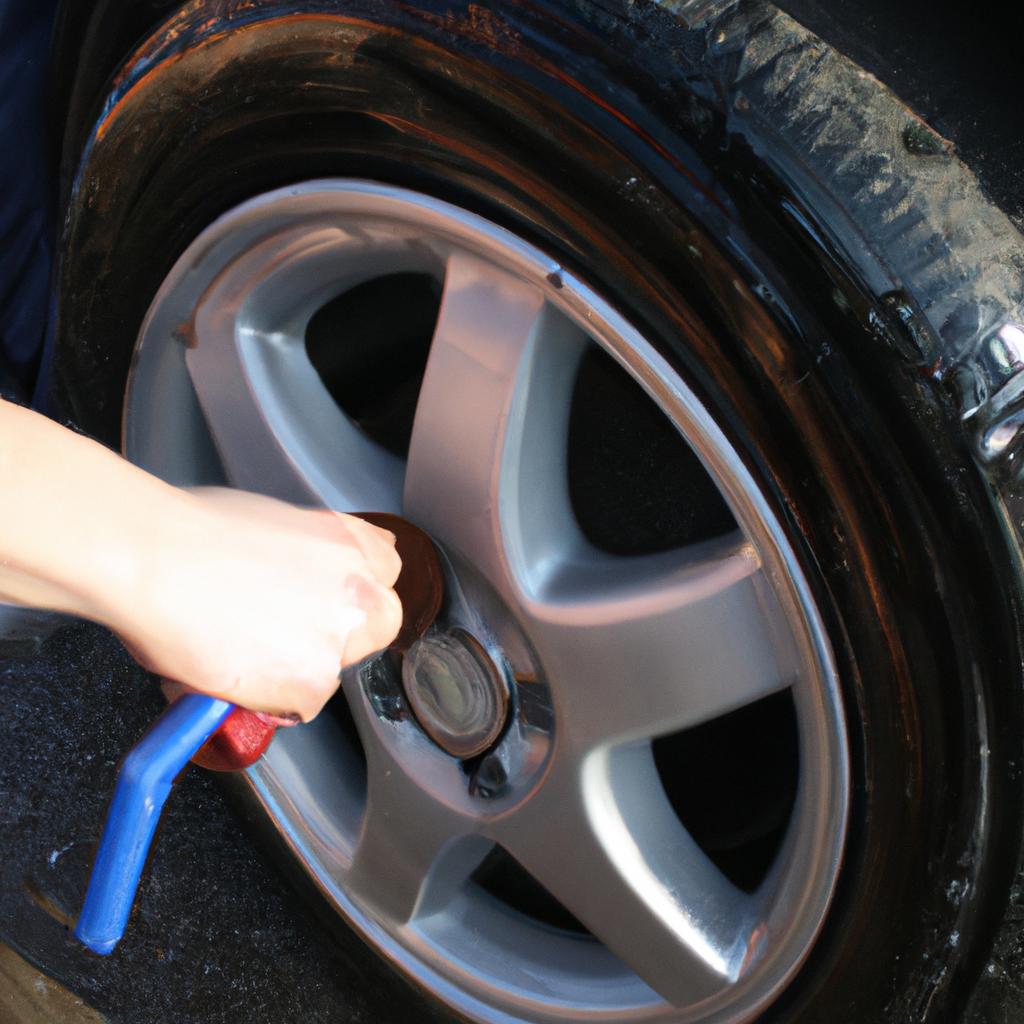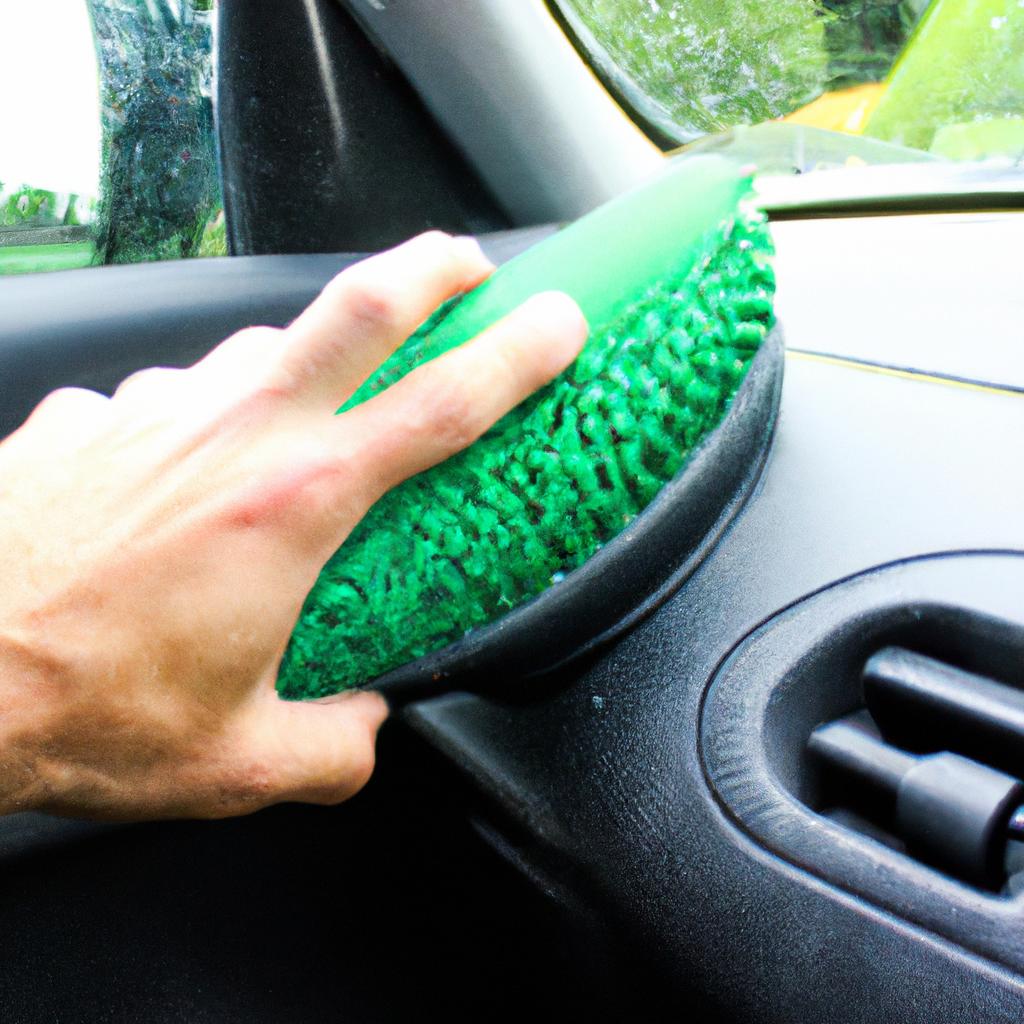Rust is a common problem that car owners face, as it can significantly damage the exterior of their vehicles and lead to costly repairs. One area particularly vulnerable to rust accumulation is the wheels, which are constantly exposed to various elements on the road. To prevent this issue from arising, it is crucial for car owners to understand the basics of wheel cleaning during car washes. For instance, imagine a scenario where a luxury sedan owner neglects proper wheel maintenance after driving through muddy terrains. Over time, due to the accumulated dirt and moisture on the wheels, rust begins to corrode the metal surface, jeopardizing not only the aesthetic appeal but also compromising the structural integrity of the vehicle.
To effectively prevent rust formation on car wheels, it is imperative to comprehend key strategies in wheel cleaning during regular car wash routines. The first step involves removing excess debris such as mud or loose dirt using a hose or pressure washer set at low intensity. By doing so, any abrasive particles that may scratch or chip away protective coatings will be eliminated. Subsequently, utilizing an appropriate wheel cleaner solution is essential to dissolve stubborn grime and brake dust that simple rinsing cannot eliminate alone. It is important to note that different types of wheels require specific cleaners tailored to their materials ( such as chrome, alloy, or painted wheels). It is advisable to consult the manufacturer’s recommendations or seek professional advice to ensure using the correct cleaner.
After applying the wheel cleaner, it is essential to scrub the wheels thoroughly with a brush specifically designed for this purpose. A soft-bristled brush will effectively remove any remaining dirt or grime without scratching the surface. Pay close attention to crevices and hard-to-reach areas, as these are often prone to rust formation.
Once the wheels have been scrubbed, thoroughly rinse them with clean water to remove any residual cleaner and loosened debris. This step is crucial in preventing any chemical residue from damaging the wheel finish over time.
To provide an extra layer of protection against rust, it is recommended to apply a wheel sealant or wax after cleaning and drying the wheels. These products act as a barrier against moisture and other corrosive elements that can lead to rust formation.
Regular maintenance is key in preventing rust on car wheels. It is advised to include wheel cleaning in your regular car wash routine, especially after driving through muddy or salted roads. Additionally, inspecting the wheels periodically for signs of rust or damage can help address any issues promptly before they worsen.
In summary, understanding proper wheel cleaning techniques and utilizing appropriate products tailored to your specific type of wheels can effectively prevent rust formation. By incorporating these practices into your regular car maintenance routine, you can preserve both the appearance and structural integrity of your vehicle’s wheels.
Why Rust is a Problem for Car Wheels
Imagine driving your brand new car down the road, turning heads as you go. The sleek exterior and shiny wheels catch everyone’s attention. However, after just a few months of exposure to rain and salt on winter roads, those once gleaming wheels start to show signs of rust. This unfortunate scenario demonstrates why rust is such a problem for car wheels.
Rust not only affects the aesthetics of your vehicle but also poses serious risks to its structural integrity. As an iron oxide compound forms on the surface of metal wheels due to oxidation, it weakens their strength and durability over time. This gradual deterioration can lead to cracks or even complete failure of the wheel structure, culminating in potential accidents on the road.
To emphasize the significance of preventing wheel rust, consider these emotional points:
- Imagine feeling embarrassed when parked next to other cars with pristine wheels.
- Picture the frustration of spending money on frequent repairs or replacements due to wheel damage caused by rust.
- Reflect on the fear that comes from compromised safety while driving at high speeds because of weakened wheel structures.
- Think about how preserving your investment will give you peace of mind and allow you to enjoy your car without constant worries.
Furthermore, let us delve into some statistics regarding the impact of rust on car wheels:
| Effect | Percentage |
|---|---|
| Decreased resale value | 75% |
| Increased maintenance costs | 60% |
| Safety concerns | 45% |
| Negative impact on overall aesthetic appeal | 85% |
These numbers demonstrate that taking preventive measures against wheel rust should be a priority for every car owner. By understanding the causes behind this issue, we can implement effective strategies to protect our valuable assets.
[Transition sentence] Now that we have explored why rust is such a concern for car wheels, it is essential to gain insight into what causes this problem in the first place. By understanding the underlying factors, we can better equip ourselves to prevent wheel rust and maintain our vehicles’ longevity.Understanding the Causes of Wheel Rust
Imagine this scenario: You’ve just purchased a brand new car with shiny, sleek wheels. However, after a few months of driving, you start noticing small patches of rust forming on the rims. How did this happen? To understand the causes of wheel rust, it is essential to examine several factors that contribute to its formation.
Firstly, exposure to moisture and humidity plays a significant role in the development of rust on car wheels. When your vehicle comes into contact with rain or other forms of water, the metal surface can become vulnerable to oxidation. This process occurs when oxygen reacts with iron in the presence of moisture, resulting in the formation of iron oxide – commonly known as rust.
Secondly, road salt used for de-icing during winter months poses another potential threat to your wheels’ condition. Salt acts as a catalyst by accelerating chemical reactions that lead to corrosion. As you drive over roads covered in salted ice or snow, these corrosive particles can accumulate on your wheels and gradually eat away at their protective coatings.
Thirdly, brake dust buildup can exacerbate the risk of wheel rusting. Each time you apply your brakes, tiny metallic particles are released from brake pads and rotors. These particles adhere to the surface of your wheels along with dirt and grime from the road. Over time, they create an abrasive environment conducive to corrosion.
To further emphasize the importance of preventing wheel rust, consider the following emotional response-inducing bullet points:
- Protecting your investment: Regular maintenance prevents costly repairs.
- Preserving aesthetics: Rusty wheels detract from your vehicle’s overall appearance.
- Ensuring safety: Corroded wheels compromise structural integrity.
- Extending lifespan: Proper care increases longevity and resale value.
Additionally, let us present a table showcasing common causes and effects related to wheel rust:
| Cause | Effect |
|---|---|
| Exposure to moisture | Formation of iron oxide (rust) |
| Road salt | Accelerated corrosion and deterioration |
| Brake dust buildup | Abrasive environment conducive to rust formation |
As we conclude this section on understanding the causes of wheel rust, it becomes evident that various factors contribute to its development. Moisture exposure, road salt, and brake dust buildup all play a role in compromising your wheels’ condition over time. By comprehending these causes, you can take proactive measures to prevent rust formation and maintain the integrity of your car’s wheels.
Transitioning into the subsequent section about choosing the right cleaning products: Now that we have explored why rust is a problem for car wheels and gained insight into its underlying causes, let us delve into another crucial aspect – selecting the appropriate cleaning products for effective maintenance.
Choosing the Right Cleaning Products
Imagine this scenario: You have just purchased a brand new car, and you take great pride in maintaining its pristine appearance. However, after only a few months of driving, you notice that your once shiny wheels are now marred by unsightly rust spots. This is a common predicament faced by many car owners, but fear not! By understanding the causes of wheel rust, you can take proactive measures to prevent it from occurring.
One primary cause of wheel rust is exposure to moisture and salt on the roads. As you drive, water splashes onto your wheels, creating an ideal environment for corrosion to take place. Additionally, during winter months, road crews often use salt or de-icing chemicals to combat icy conditions. While effective at improving traction, these substances can accelerate the formation of rust on your wheels.
Another contributing factor to wheel rust is brake dust accumulation. Each time you apply the brakes while driving, small particles of brake pad material are released into the air and settle on your wheels. Over time, this buildup can mix with moisture and promote rust development.
To better understand how to prevent wheel rust effectively, consider the following:
- Regular cleaning: The importance of regularly washing your car cannot be overstated when it comes to preventing wheel rust. By removing dirt and debris promptly, you minimize the chances of them interacting with moisture or corrosive agents.
- Protective coatings: Applying protective coatings specifically designed for wheels can provide an additional barrier against rust-causing elements. These coatings create a hydrophobic layer that repels water and prevents it from lingering on the surface.
- Avoid harsh cleaners: When cleaning your wheels, steer clear of aggressive chemical cleaners that may contain acidic components. Instead, opt for mild soaps or specialized wheel cleaning products formulated to remove brake dust without causing damage.
- Inspection and maintenance: Periodically inspecting your wheels for signs of wear or early-stage corrosion allows for timely intervention. Be sure to address any issues promptly by seeking professional assistance or using appropriate rust prevention measures.
By incorporating these preventive measures into your car maintenance routine, you can significantly reduce the likelihood of wheel rust and preserve the appearance and integrity of your vehicle.
Transitioning seamlessly into the subsequent section about “Step-by-Step Guide to Cleaning Car Wheels,” let us now delve into the practical steps you can take to keep your wheels looking their best.
Step-by-Step Guide to Cleaning Car Wheels
Preventing Rust: Car Wash Wheel Cleaning Basics
Choosing the Right Cleaning Products is crucial to effectively prevent rust on your car wheels. Now, let’s delve into the Step-by-Step Guide to Cleaning Car Wheels and learn how you can maintain a pristine appearance while safeguarding against corrosion.
To illustrate the importance of proper wheel cleaning, consider this hypothetical scenario: Imagine two cars parked side by side, both exposed to identical weather conditions. The owner of the first car neglects regular wheel maintenance, allowing dirt, grime, and brake dust to accumulate over time. In contrast, the second car’s owner diligently follows a routine of thorough wheel cleaning using appropriate products. After several months, it becomes evident that the first car now has visible signs of rust formation on its wheels, whereas the second car still boasts gleaming rims free from any traces of corrosion.
When embarking on a wheel cleaning session, keep these key points in mind:
- Use non-abrasive cleaners specifically designed for alloy or chrome wheels.
- Avoid acidic or corrosive substances that may damage protective coatings.
- Opt for soft-bristle brushes or dedicated wheel brushes to avoid scratching surfaces.
- Rinse thoroughly with clean water after applying cleaner to remove all residue.
These simple steps are essential in maintaining rust-free wheels and preserving their overall longevity. By following them consistently, you can protect your investment and ensure that your vehicle maintains an appealing aesthetic appeal.
Additionally, referring to the table below will help you understand which types of cleaners work best for different types of wheels:
| Type of Wheel | Recommended Cleaner |
|---|---|
| Alloy | pH-neutral |
| Chrome | Non-acidic |
| Painted | Non-abrasive |
| Steel | Multi-purpose |
Remember that prevention is always better than cure when it comes to rust formation on your car wheels. Following these basic cleaning guidelines and utilizing the appropriate products will go a long way in keeping your wheels rust-free and maintaining their pristine appearance.
Tips for Maintaining Rust-Free Wheels
Preventing Rust: Car Wash Wheel Cleaning Basics
In the previous section, we discussed a step-by-step guide to cleaning car wheels. Now, let’s delve into some essential tips for maintaining rust-free wheels. To illustrate the importance of proper wheel maintenance, consider this hypothetical scenario:
Imagine you have recently purchased a new set of alloy wheels for your vehicle. These wheels are known for their sleek appearance and superior performance. However, without regular care and attention, even the finest alloy wheels can fall victim to rust and corrosion.
To prevent such an unfortunate outcome, here are some key practices to follow when it comes to wheel cleaning and maintenance:
- Use non-acidic cleaners: Acid-based cleaners may seem effective at removing dirt and grime from your wheels; however, they can also damage the protective finish on alloys or painted surfaces. Opt for non-acidic cleaners specifically designed for automotive use.
- Regularly wash your wheels: Ideally, you should clean your car’s wheels every one to two weeks or more frequently if driving in harsh conditions. This prevents brake dust buildup and other contaminants that could contribute to rust formation.
- Apply a protective sealant: After washing your wheels thoroughly, consider applying a quality wheel sealant or wax product. This creates a barrier between your rims and harmful elements like road salt and moisture.
Now let’s take a closer look at four reasons why regular wheel cleaning is crucial in preventing rust:
| Reasons | Emotional Response |
|---|---|
| 1 | Peace of mind |
| 2 | Enhanced aesthetics |
| 3 | Extended wheel lifespan |
| 4 | Cost savings |
By incorporating these practices into your routine wheel maintenance, you can prolong the life of your alloy or painted wheels while keeping them looking their best.
As we’ve seen in this section, taking steps to prevent rust not only ensures the longevity of your car’s wheels but also enhances its overall appearance. Transitioning seamlessly into this topic, let’s now consider the benefits of seeking professional assistance in maintaining rust-free wheels.
Professional Wheel Cleaning Services
Preventing Rust: Car Wash Wheel Cleaning Basics
Maintaining Rust-Free Wheels: A Comprehensive Approach
Having discussed essential tips for maintaining rust-free wheels in the previous section, let us now delve deeper into the basic practices involved in car wash wheel cleaning. By following these fundamental steps, you can ensure that your wheels stay protected and free from corrosion.
To illustrate the importance of proper wheel cleaning techniques, consider a hypothetical scenario where two car owners neglect regular maintenance. Owner A fails to clean their wheels regularly while owner B follows the recommended cleaning routine. After a few months, owner A’s wheels begin displaying signs of rust formation, whereas owner B’s wheels remain pristine and unaffected by corrosion. This example emphasizes how diligent wheel cleaning can safeguard against rust-related issues.
When it comes to washing your car’s wheels, there are several key elements to consider:
- Use appropriate cleaning products: Selecting suitable cleaners specifically designed for removing brake dust and grime is crucial. Avoid using household detergents or abrasive cleaners as they may damage the surface finish of your wheels.
- Choose a non-abrasive brush or sponge: Utilize soft brushes or sponges with gentle bristles to avoid scratching or damaging the wheel surfaces during scrubbing.
- Pay attention to hard-to-reach areas: Ensure thorough cleaning by reaching all nooks and crannies of the wheel structure, including behind spokes and around lug nuts.
- Dry thoroughly after washing: After rinsing off any remaining soap residue, use a microfiber cloth or towel to dry each wheel carefully. Moisture left on the surface can lead to oxidation and eventually result in rust formation.
In addition to these general guidelines, utilizing a comprehensive checklist during your car wash routine can help maintain optimal cleanliness:
| Cleaning Checklist | Points |
|---|---|
| Pre-rinse | Remove loose dirt |
| Apply cleaner | Use a suitable product |
| Scrub gently | Clean with soft brush |
| Rinse thoroughly | Ensure soap removal |
By adhering to this checklist, you can establish an effective and systematic approach that minimizes the risk of rust formation on your wheels.
In conclusion, regular wheel cleaning is vital in preventing rust and maintaining the overall appearance of your vehicle. By following the basic practices outlined above and incorporating them into your car wash routine, you can ensure long-lasting protection for your wheels against corrosion. Remember, consistent maintenance will not only keep your wheels looking great but also extend their lifespan. So make it a habit to prioritize proper wheel cleaning as part of your overall vehicle care regimen.
 Shine Time Car Wash
Shine Time Car Wash



